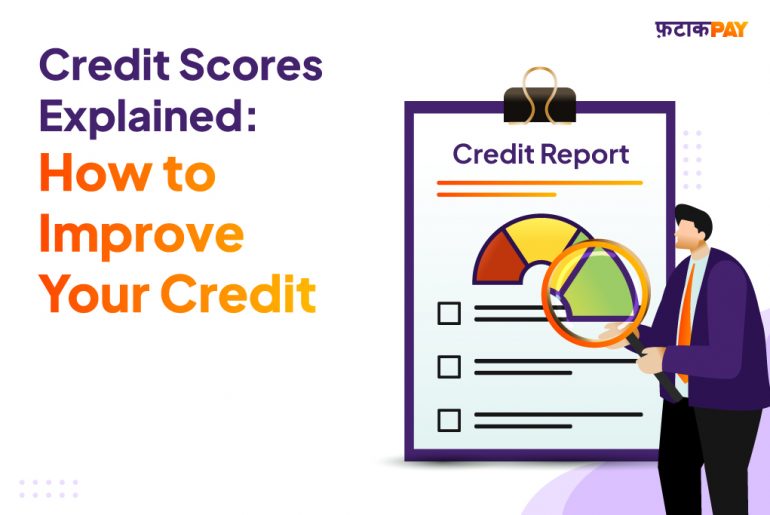Credit Score are more than numbers; they judge your ability to obtain finance. It decides whether you get a 20000 loan on aadhar card, or even an interest rate that is competitive with yours. Nevertheless, many individuals need help comprehending the intricacies of credit scores and how to enhance them.
We’ll be exploring the fascinating world of credit scores, explaining how they work and calculating them, and giving you practical advice for improving your credit score.
Understanding Credit Score:
What is a Credit Score?
A credit score comprises three digits representing your creditworthiness. It mirrors a financial report card for lenders, providing insights into your credit reliability.
Like financial grade, your credit rating is created by adding your borrowing and repayment history. This information helps lenders to have a glimpse into your financial stability, rendering it the pivotal element when evaluating loan applications. Lenders are more likely to extend their trust to individuals with higher credit ratings.
Why are Credit Score Important?
Credit scores wield a substantial influence on your financial life. They dictate your eligibility for various financial products and their accompanying terms and conditions.
Your credit score serves as the key to unlocking numerous financial opportunities. It significantly impacts your economic well-being, transcending beyond the quantum of credit you can access or your credit card limit.
It fundamentally affects the interest rates you will offered. A higher credit score invariably translates into lower interest rates, resulting in long-term financial savings.
Credit Score Ranges
In India, CIBIL and Equifax are two prominent credit rating models. Typically, scores range between 300 and 900, with higher scores indicating a reliable credit profile.
While CIBIL accepts payments via Internet banking, credit, or debit cards, Equifax solely accepts demand drafts. Both entities offer comprehensive credit reports. Additionally, Equifax provides a detailed credit report with visual representations for easier comprehension.
How Are Credit Score Calculated?
1. Factors Affecting Your Credit Score
For the sake of clarity, there are various types of factors that impact your credit rating. We have mentioned a few factors below:
- Payment history: This factor is pivotal. Lenders seek assurance that you adhere to timely bill payments. Delayed payments, collections, and bankruptcies can significantly tarnish your credit scores.
- Credit utilization: This shall indicate how much credit is available to you. Your score may be adversely affected by high balances on your cards relative to the credit limits. You will aim for a credit utilization of less than 30 %.
- Length of credit history: Your score will benefit from the size of your credit history. Length of credit history demonstrates an excellent track record in using credit responsibly.
- Types of Credit: Keeping a mix of credit accounts (credit cards, advance salary loans, mortgages) can positively influence your credit score. It shows that you have the ability, in good faith, to deal with different types of credit.
- New credit inquiries: Each credit application initiates a complex search on your credit report, leading to a minor credit score reduction. To mitigate this, it is advisable to prudently seek loans and credit cards and consolidate applications based on the same type of loan within a specific time frame.
2. Credit Reports and Scoring Agencies
Three major credit reporting agencies – CIBIL, Equifax, and Experian – are responsible for maintaining your credit reports. These agencies collect and retain data regarding your credit accounts, encompassing payment history, credit limits, and account balances.
How to Check Your Credit Score
1. Obtaining Your Credit Report
Each primary credit agency provides one free credit report annually. Regularly reviewing your credit report can facilitate the identification and rectification of errors.
Ensuring the accuracy of your credit reports and identifying issues merits periodic review. Legislation empowers each central credit rating agency to furnish one free annual credit report.
The Annual Credit Report website facilitates access to these reports. This access enables you to identify and address inaccuracies and monitor your credit history.
2. How to Check Your Credit Score for Free
Many credit card companies now offer the opportunity to their customers to monitor their credit scores without charges. These scores are frequently updated and provide valuable insights into your credit health.
Additionally, several reputable websites such as Credit Karma or Credit Sesame give information on your credit score with tools for understanding and managing it.
Tips to Improve Your Credit Score
1. Pay Your Bills on Time
Timely bill payments are among the most critical measures to enhance your credit score. A foundation of a high credit rating rests upon punctual payments. Delayed payments can have a plethora of adverse consequences. To prevent missing payment deadlines, consider configuring automatic bill payments.
2. Reduce Credit Card Balances
A high credit card balance can impact your credit score, even if you make on-time payments. It’s because of the credit utilization rate, which indicates the percentage of available credits you are using. To elevate your rating, maintain credit card balances at or below 30% of the credit limit.
3. Maintain a Mix of Credit Types
Diversifying your credit portfolio by encompassing various credit account types like credit cards, installment loans, and mortgages can positively influence your credit score. However, exercise caution to avoid opening multiple new accounts simultaneously, as this can potentially decrease your credit score due to increased hard inquiries.
4. Lengthen Your Credit History
The age of your credit accounts is the basis of your credit score. Consequently, closing previously opened accounts is inadvisable, as it may truncate your credit history. The longevity of your credit history is what matters.
The older your credit history, the more positively it impacts your credit score. Thus, preserving old accounts is recommended to ensure a favorable credit history.
5. Dispute Inaccuracies on Your Credit Report
You must contest any inaccurate information with credit bureaus to verify the precision of your credit profile. Errors in your credit report can detrimentally affect your credit rating.
Regularly reviewing your credit reports is essential to identify and rectify mistakes. To ensure the accuracy of your credit profile, if any errors are detected, please communicate them to a credit bureau.
6. Exercise Caution with New Credit Inquiries
Every new loan application initiates a comprehensive inquiry into your credit report. Each tricky question can marginally diminish your credit rating. To mitigate this, exercise discretion when applying for loans and credit cards, grouping applications of the small instant loan type within a specific timeframe.
7. Set Up Payment Reminders
The absence of payments is a recurrent cause of a poor credit rating. Many financial institutions and mobile applications offer payment reminders to help you adhere to due dates. This service is available from many banks, and smartphone apps can aid in tracking deadlines.
8. Utilize Credit-Building Tools
Credit-building tools are available if you are new to credit or trying to rebuild it after a financial setback. Secured credit cards and credit builder loans can be valuable instruments for establishing or rebuilding your credit history. These products cater to individuals with limited or impaired credit.
The Key to Credit Score Improvement
1. The Role of Time
Time plays a pivotal role in enhancing your credit score. Improving your credit score is not an overnight process but a matter of patience and time. As you age, adverse items on your credit report, such as late payments and collection accounts, exert diminishing influence. If you show appropriate credit use, these negative elements will be neglected while calculating your credit score.
2. Patience in Rebuilding Credit
Whether you have encountered late payments, insolvency, or other adverse events, rebuilding your credit requires time. It’s imperative to exhibit responsible credit usage and punctual payments. These affirmative actions are instrumental in securing a superior credit rating in the future.
3. Seeking Professional Assistance
Consider seeking professional guidance if you encounter challenges in managing debt or enhancing your credit. Credit counseling agencies can offer advice on budget planning and debt management. They may also provide debt repayment plans to aid in more effective debt settlement.
Improve your credit score with FatakPay:
Suppose, you went for festival shopping, but suddenly you notice that you sorted on a few thousand. Still, you don’t need to worry if you have FatakPay because it provides you with Advance salary(instant credit) and Loans, But that’s only some of it.
With its unique feature of NACH (an automated payment system), you can quickly repay your credits without lifting a finger. Link NACH with your bank account, and it will automatically deduct the required amount for repayment every month.
The best part? FatakPay has helped 90% of its customers improve their credit score, making it a reliable and effective solution to all your credit score problems.
Conclusion
In conclusion, your credit rating transcends beyond being a mere number; it is the key to unlocking many financial opportunities. By comprehending the mechanics of credit scores and taking affirmative steps to enhance them, you position yourself to access more diverse financing options. Remember, sound financial habits and patience are the keys to improving your credit score.
Initiate your journey now, and you will witness an elevation in your credit rating, enabling you to realize your financial objectives and aspirations. Your financial future lies within your control, so elevate it to new heights.
Cultivating and sustaining a healthy credit rating is an ongoing endeavor that yields substantial benefits, including reduced interest rates, accessible credit, and the peace of mind associated with financial stability.
Are you looking for more interesting content? Check out our other exciting blogs and explore a world of fascinating topics!







